About the Centre for Health Crises
At the Centre for Health Crises, we work in an interdisciplinary manner across multiple areas of expertise, with a long-term focus on policy development, catalysing research, and developing training and exercises. At the same time, we stand by to respond to urgent needs, with training initiatives and expert support. We work from an 'all hazards perspective', which means that we look at both health threats and vulnerabilities that can create or contribute to health crises.
Our work is based on the core tasks of Swedish universities, as defined by law: education, research and outreach, as well as what we choose to call the 'fourth task' - supporting the surrounding community before, during and after health crises.
Strategic Goals
The strategic goals give our work a direction and purpose, and guides us in our activities.
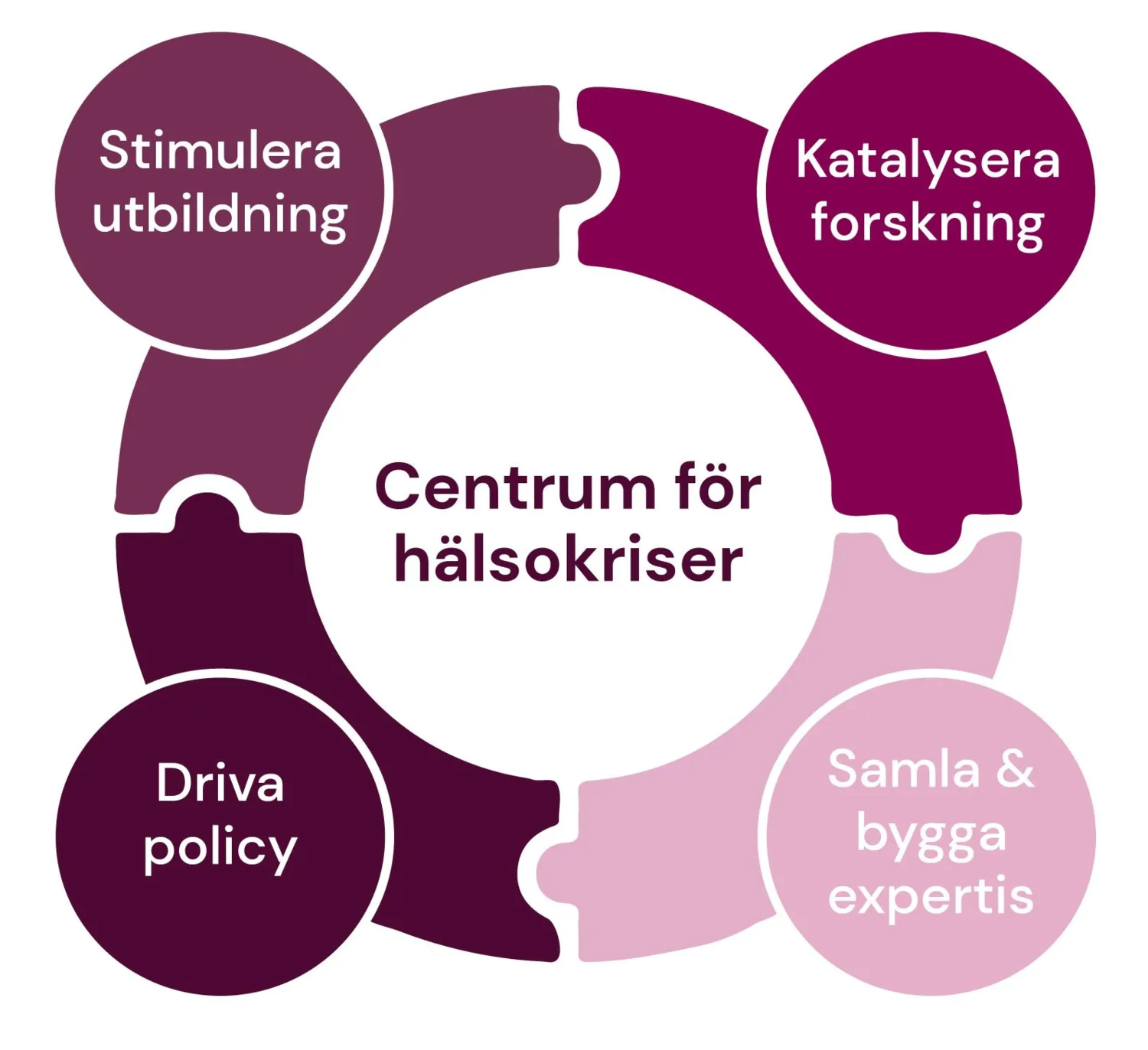
- Catalyse research collaborations within the field of health crises and create meeting spaces for interdisciplinary collaboration
- Stimulate and participate in the development of new education within different health crises subjects
- Gather existing and build new health crises expertise, and supply specific know-how and competence
- Drive policy development and in collaboration, set the agenda for increased health crises preparedness
- Act as KI’s and its managements sensor for new health threats, and contribute to the coordination of KI’s efforts in a health crisis
Our vision
A society better prepared for future health crises.
Our mission
By way of research, education, and interdisciplinary collaboration, we want to contribute to improved preparedness and ability to handle future health crises.
Our mission is to do so by building the next generation of health crisis experts. We want to make sure that knowledge and proven experience inform policy and plans for the handling of future health crises.
Focus areas
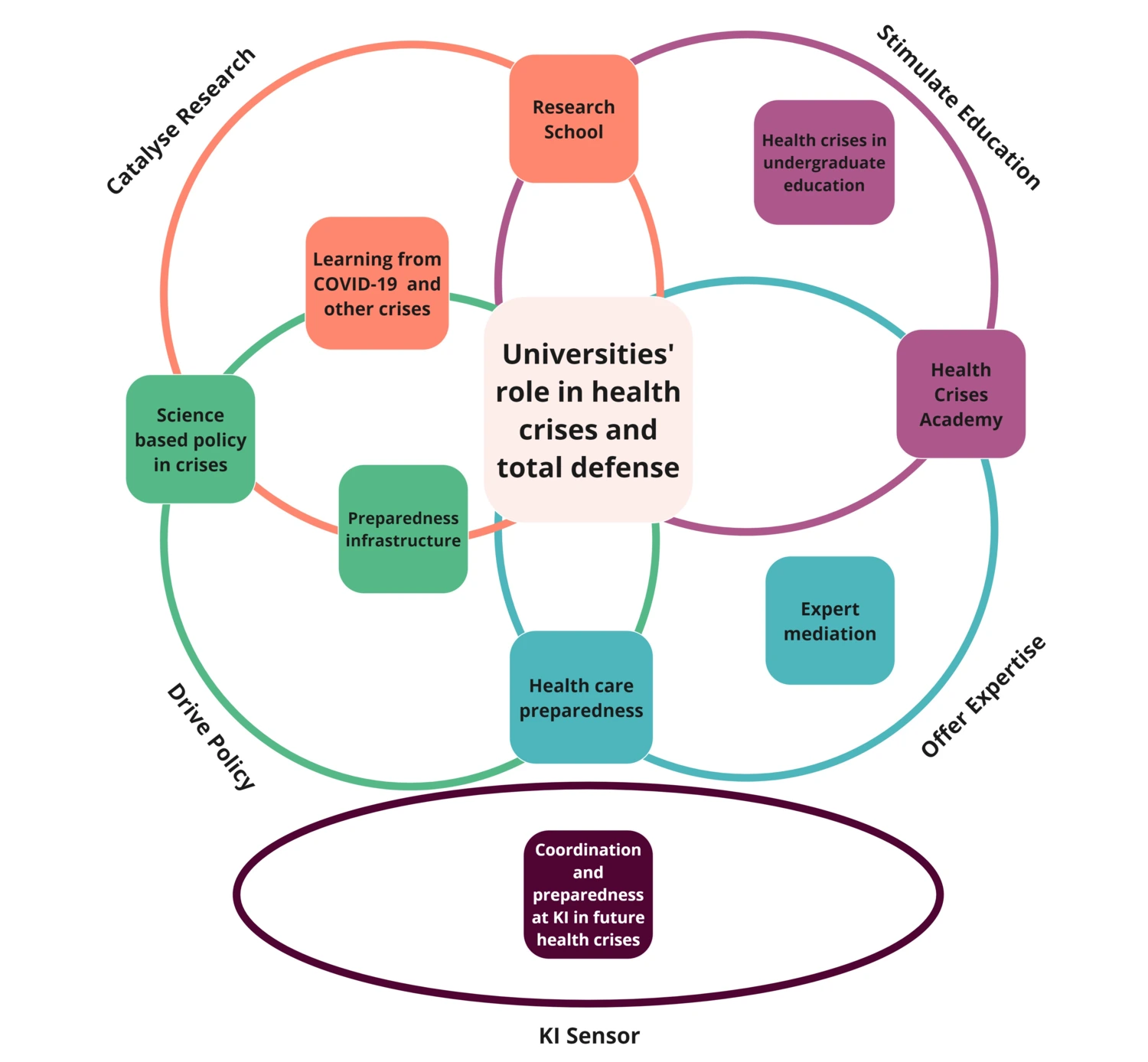
For the period 2024-2026, we organise our activities around 10 focus areas linked to our strategic objectives. The focus areas relate to education and research, as well as expertise transfer and policy development. Based on our focus areas, we have clustered our operation further in two programme areas, in science to policy, and in education - which we call the Health Crises Academy.
While the focus and programme areas provide clarity and direction, we remain agile, adapting our activities to respond to potential or emerging health crises.
Read more about our focus areas and how we work within them in our work plan:
The Centre for Health Crises' work plan
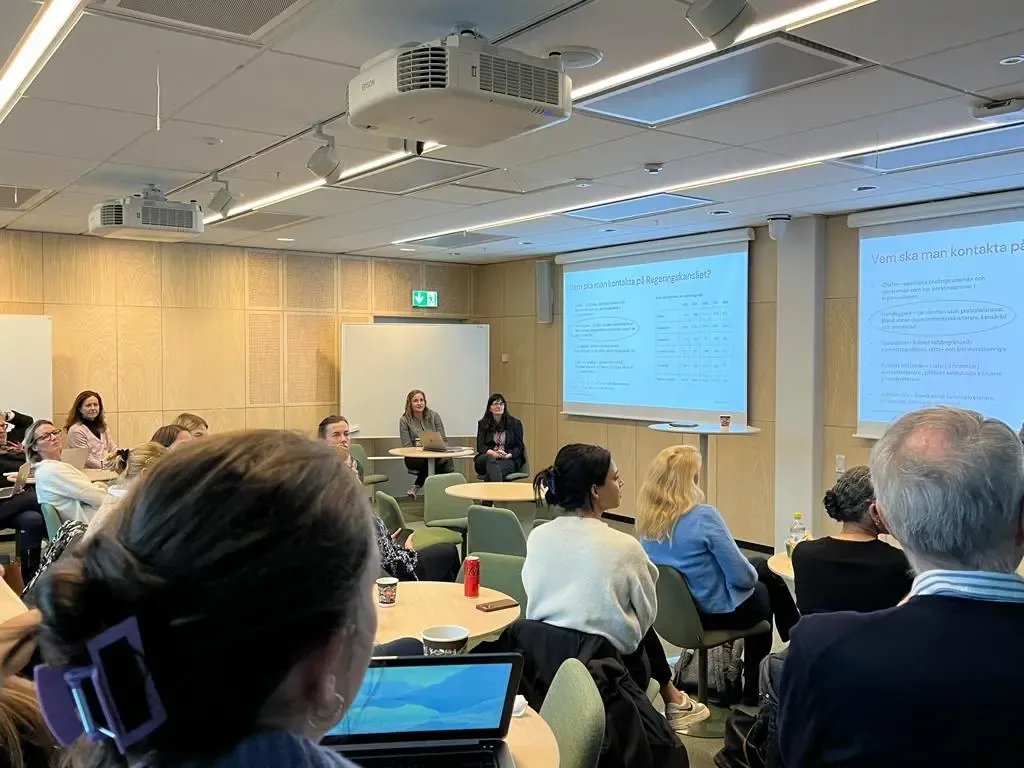
Programme area science to policy
In the programme area science to policy, we work to advocate for decision-making and policy development to be based on science and highlight the importance of the role of universities in supporting society in a health crisis. By structuring our work in this way, it enables us to pool our expertise more clearly and utilise it in the most impactful ways. In particular, we pursue the following focus areas as themes in our advocacy for science-based policy development:
- Universities’ role in health crises and total defence
We believe that universities have a role to play in contributing to the rest of society, before, during and after health crises, and as part of the total defence. However, the role needs to be defined and developed, through dialogue with all stakeholders and by maintaining the independence of universities. - Learning from the COVID-19 pandemic and other health crises
To be better prepared for the next health crisis, it is of the utmost importance that we build on the lessons we can learn from previous crises. In the health sector, the COVID-19 pandemic is one such previous crisis where we see that there is great scope to actively work on lessons learned and improvements. - Preparedness in the health care sector
Strong preparedness of the health sector for future health crises is a prerequisite for a strong societal preparedness and a key role in total defence. Thanks to our close links to clinical and practical work in healthcare, we can drive issues related to its preparedness, supported by research and our expertise in training.
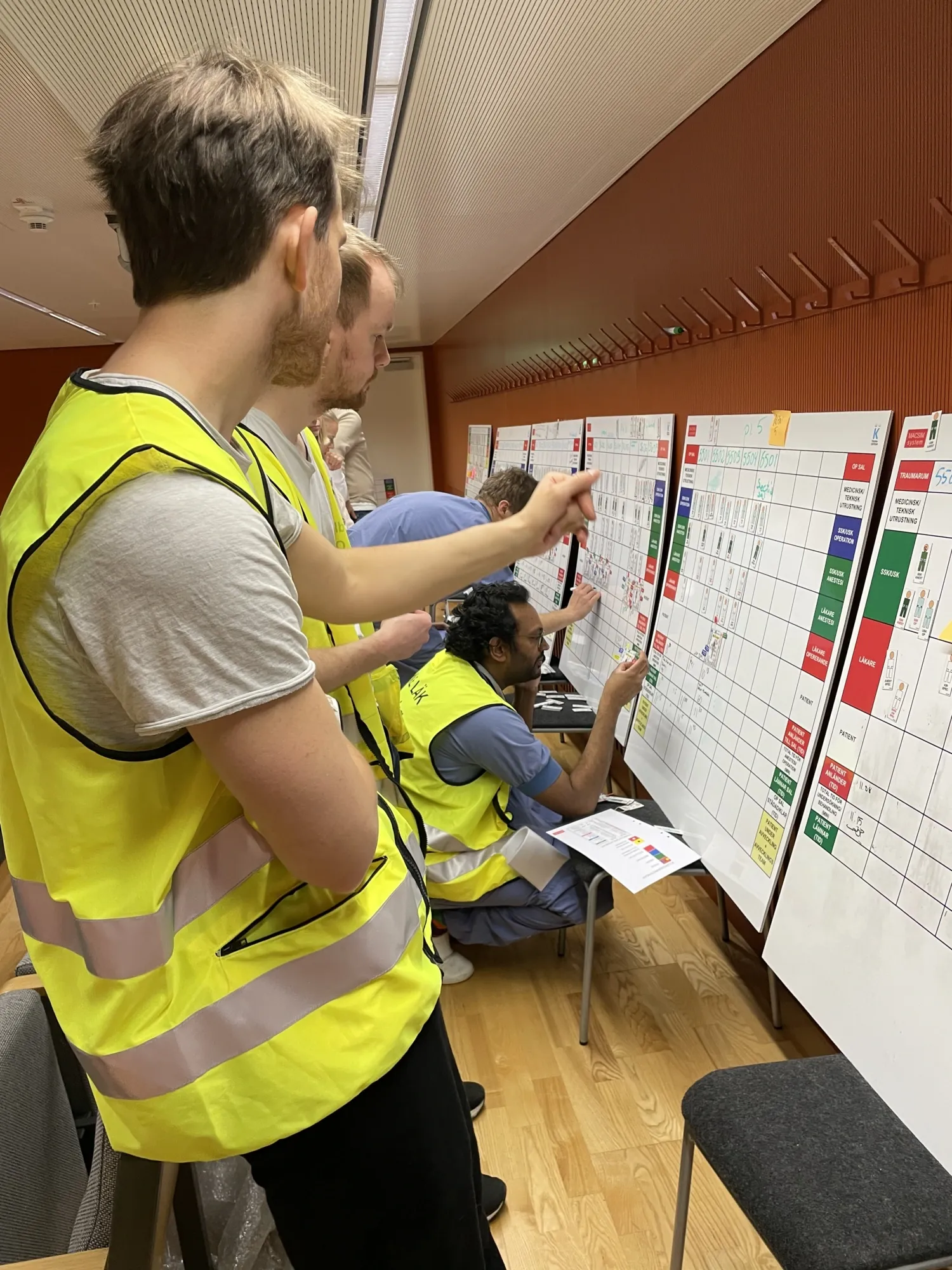
Programme area Health Crises Academy
Education, training and exercises are crucial to ensure good preparedness and management of health crises and are a key part of the total defence. This is why we have chosen to make it one of our programme areas, which we developed based on our focus areas. Three of our focus areas for activities are related to training:
- Health Crises Academy
- Health crises in undergraduate programmes,
- Research School in health crises
Based on this, we have created the programme area Health Crises Academy, where we work partly on delivering courses and other educational programmes, but also on developing new education and conduct advocacy to promote the other two focus areas: making health crises a part of undergraduate training and establishing a research school in health crises.
Areas of expertise
Working on health crises from a broad, interdisciplinary perspective, bringing together expertise in a number of relevant fields, allows us to identify and connect trends, solutions and approaches relevant to health crises at large. This in turn leads to better resource utilisation and contributes to a holistic approach to health crisis preparedness and management.
We have chosen to bring together expertise and experience in a number of areas relevant to health crises, where we see that we can make a particular contribution to the wider community. In each of the areas, we have an expert coordinator, who has long experience, a large network of contacts and good expertise in the area. Our expert coordinators are closely linked to clinical and practical work in different phases of health crises.
Our areas of expertise allow us to have a broad, interdisciplinary skills base at the Centre, they open up opportunities for collaboration and knowledge sharing across agencies. They also enable us to second expertise internationally to ongoing health crises and to strengthen preparedness for future ones. In addition to our expert coordinators, we also have access to expertise through our Health Crises Network.
Currently, our areas of expertise are:
- Emergency surgery – expert coordinator Lisa Strömmer
The generalist expertise and skills available in emergency and trauma surgery are particularly important in a health crisis, as needs always exceed available resources. - Extreme weather, climate, and health effects – expert coordinator Petter Ljungman
Climate change and more frequent extreme weather events, such as heat waves, droughts, etc., pose serious health threats that can create health crises in their own right and exacerbate other types of crises. - Health system resilience – expert coordinator Helena Nordenstedt
The vulnerability of a health system, both for the individual and the society, will determine its ability to prepare, manage and learn from a crisis. Building and maintaining robust and resilient health systems is crucial for managing health crises. - Infectious diseases and vaccine preparedness – expert coordinator Helena Hervius Askling
Infectious diseases can create serious health crises. Vaccines are an important aspect of preparedness, as is effective case management and implementation of vaccination once a crisis has occurred. - Critical care with limited resources – expert coordinator Märit Halmin
In almost all health crises, regardless of how and why they occur, the need for intensive patient care increases, while the conditions for delivering it change. Being able to work with scarce resources therefore becomes an essential skill. - Chemical and toxicological events– expert coordinator Mattias Öberg
Accidents and deliberate releases of chemical and toxicological substances are a serious threat to health. Preventing such events and managing them appropriately is crucial for health emergency preparedness. - Laboratory and diagnostic surge capacity – expert coordinator Jessica Alm
There is a need for laboratory equipment and diagnostic capacity in many health crises, from infectious diseases to chemical spills. Being able to scale up these activities is an important part of health crisis preparedness. - Mental health prepardness – expert coordinator Karima Assel
A comprehensive approach to health crises also needs to cover mental health and psychosocial support. - Policy and preparedness – expert coordinator Maja Fjaestad
Health crises occur in a social and societal context, which determines the level of preparedness, how the crisis is managed and the opportunities to learn from it. Therefore, we need to understand these structures and how they can be influenced. - Outbreak preparedness and response – expert coordinator Hedvig Glans
Outbreaks of infectious diseases can be difficult, even impossible, to cure and far from all can be prevented by vaccines. Preparing for them and knowing how to deal with them is crucial to prevent an escalating health crisis.
Our definition of a health crisis
We define a health crisis as: A hazardous disruption that causes significant effects on human health and that risks exceeding the health system’s ability to cope.
The onset, scope and severity of a health crisis is determined by the disruption/threat, the vulnerability of individuals and the health system, and the extent of exposure in a given situation.
Work method
We work according to an 'all hazards' perspective. The WHO defines the ‘all hazards perspective’ as: although health threats may have different origins (natural, man-made), they often affect health systems in similar ways and require a multisectoral response.
To us, this means that while some aspects are specific to a particular type of health crisis, there are also commonalities. We need to understand how health threats and harmful disruptions affect health systems and societies as a whole. These include infectious diseases, climate impacts on health, disaster medicine, trauma, CBRN (chemical, biological, radiological, nuclear elements) and many more. At the same time, we need to understand what vulnerabilities exist within a given context or health system, the level of exposure to the threat or disruption, and the capacity of the system to respond. The more resilient a health system is, the better it will cope when exposed to a threat, be it an earthquake or a longer-term threat, such as increased antibiotic resistance.
A common aspect of health crises is the need for surge capacity - the ability to scale up. Depending on the type of crisis, this can involve scaling up everything from intensive care to diagnostics.
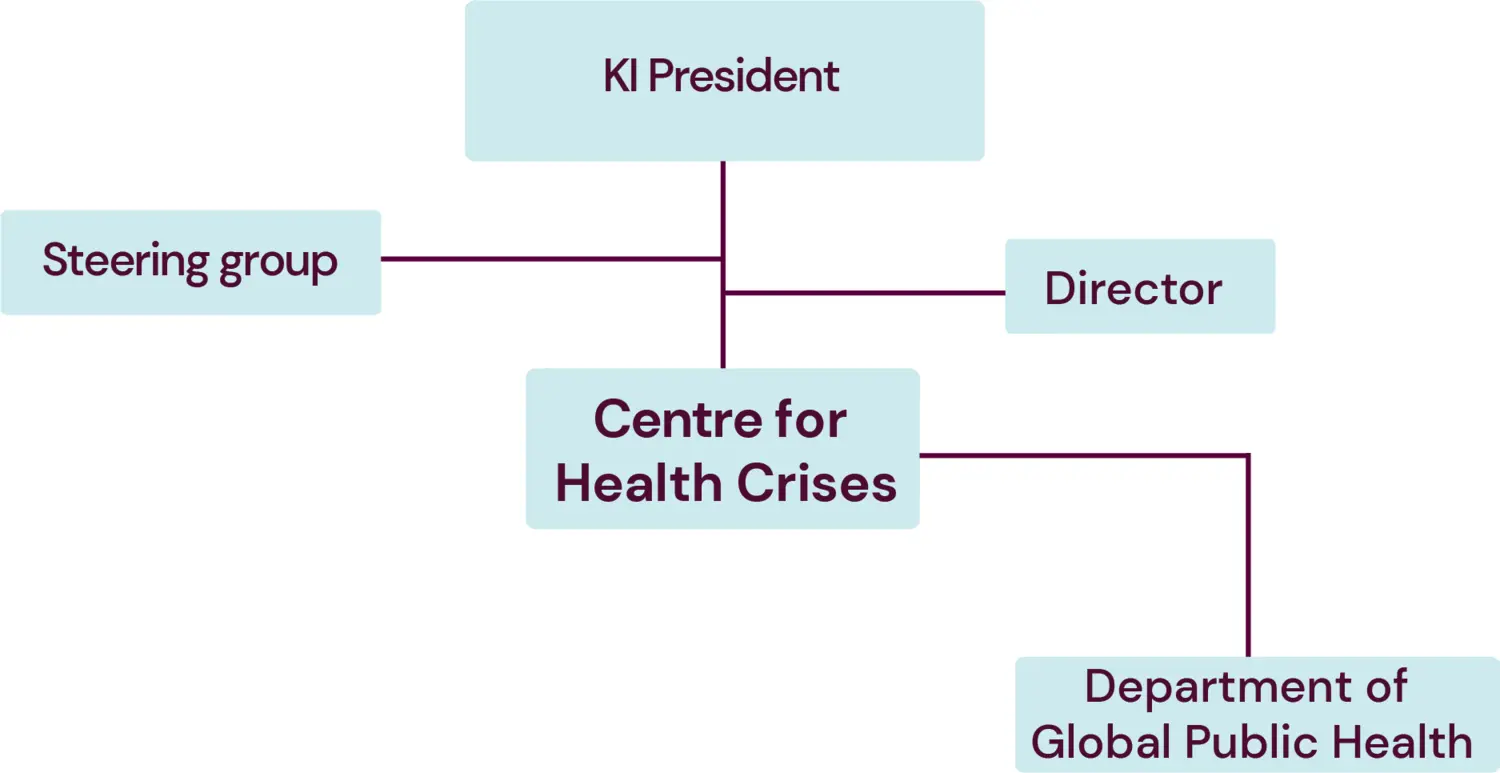
Organisation
Organisationally, we are based in the institution where our director is employed (currently the Department of Global Public Health). To ensure transparency in relation to that department, it is represented in our steering group.
The Centre reports, via our Director and Steering Group, directly to the President of KI.
As part of our role at KI, we also support the university's management with advice and expert support in a health crisis.
Office
In the office, we are a group of core staff led by our Director and Strategic Process Leader. In addition to them, the core staff consists of an administrative coordinator, a coordinator for university collaboration, and a communications officer. Their contact details can be found on the start page.
Our office is located at the Department of Global Public Health in Widerströmska huset at KI campus Solna.
Steering Group
Our Steering Group consists of representatives from several departments at KI, as well as external partners. They ensure that the development of, and work within, the Centre is done in accordance with our mission. They also provide advice and support for the Centre's continued development.
The members of the Steering Group for the period 2025-01-01 to 2027-12-31 are:
- Hans-Gustaf Ljunggren, Department of Medicine, Huddinge (chairman)
- Tobias Alfvén, Department of Global Public Health
- Anna-Mia Ekström, Department of Global Public Health
- Maria Eriksdotter, Department of Neurobiology, Care Sciences and Society
- Marie Hasselberg, Department of Global Public Health, (Head of Department at the Centre's administrative host department)
- Ulrika Widegren, Professional Services KI
- Sebastiaan Meijer, the Royal Technical University - KTH
- Staffan Svärd, Pandemic Laboratory Preparedness, Sci-LifeLab, Uppsala University
Background to the creation of the Centre for Health Crises
KI established the Centre for Health Crises in the summer of 2021, with the intention of developing ways to coordinate, and further develop the research, training initiatives and capacities that were started at KI during the COVID-19 pandemic. Although the COVID-19 pandemic was the catalyst for the creation of the Centre, the need for coordination in health crisis management is not new. Previous health crises, such as the Ebola epidemic in West Africa in 2014, highlighted the need for stronger, better - more resilient - health systems.
The Centre was created to be able to act quickly and flexibly in the event of future health crises, and to help coordinate KI's response to such crises. We demonstrated this ability just weeks after we became operational, when Russia invaded Ukraine in February 2022, and we had to adapt quickly and deal with a very different type of health crisis.
We continue to see a need to approach health crises in a broad sense and from an 'all-hazards' perspective, as well as to utilise and develop the role of universities.
